
by Solange Lopes | Mar 12, 2018 | Make More Money
 One of the biggest obstacles women face at work and in life has everything to do with money. From not being paid on an equal scale with our male counterparts, to managing our own finances, dealing with money can present serious challenges for the modern woman. If you add to it the common stereotypes affecting women in all areas of work and life, establishing good financial habits can be quite the daunting prospect. Hence the need for some solid financial advice, as well as inspirational quotes about money from women who have mastered their own finances.
One of the biggest obstacles women face at work and in life has everything to do with money. From not being paid on an equal scale with our male counterparts, to managing our own finances, dealing with money can present serious challenges for the modern woman. If you add to it the common stereotypes affecting women in all areas of work and life, establishing good financial habits can be quite the daunting prospect. Hence the need for some solid financial advice, as well as inspirational quotes about money from women who have mastered their own finances.

Here are 12 powerful quotes from famous women who have lived and shared some of the most inspirational money advice:
12 Quotes about Money From Famous Women that’ll Make You Financially Savvy
“Never work just for money or for power. They won’t help save your soul or help you sleep at night.” Marian Wright Edelman, Children’s Rights Activist
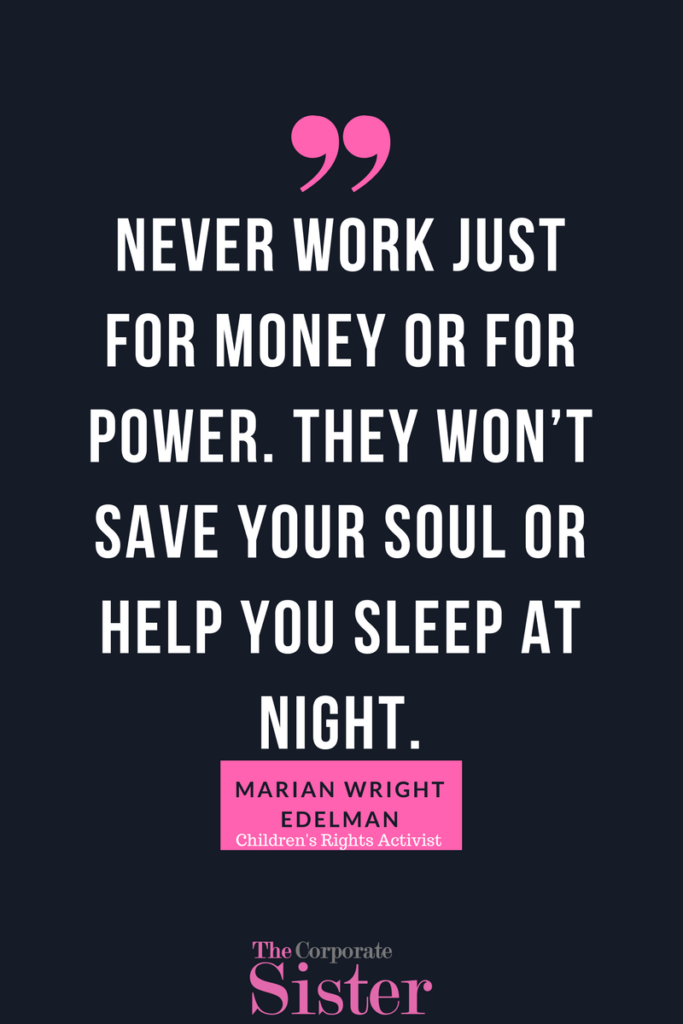
“I truly believe that women should be financially independent from their men. And let’s face it, money gives men the power to run the show. It gives men the power to run the show. It gives men the power to define value. They define what’s sexy. And men define what’s feminine. ” Beyonce, American singer and actress
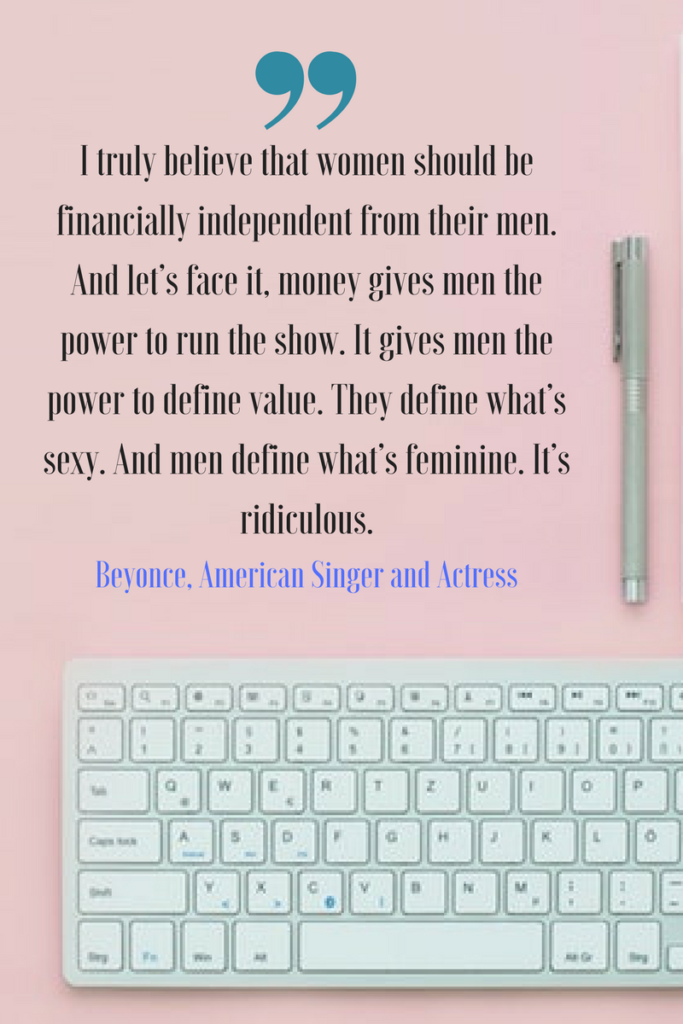
“A woman’s best protection is a little money of her own.” – Clare Booth Luce, American Author and US Ambassador.
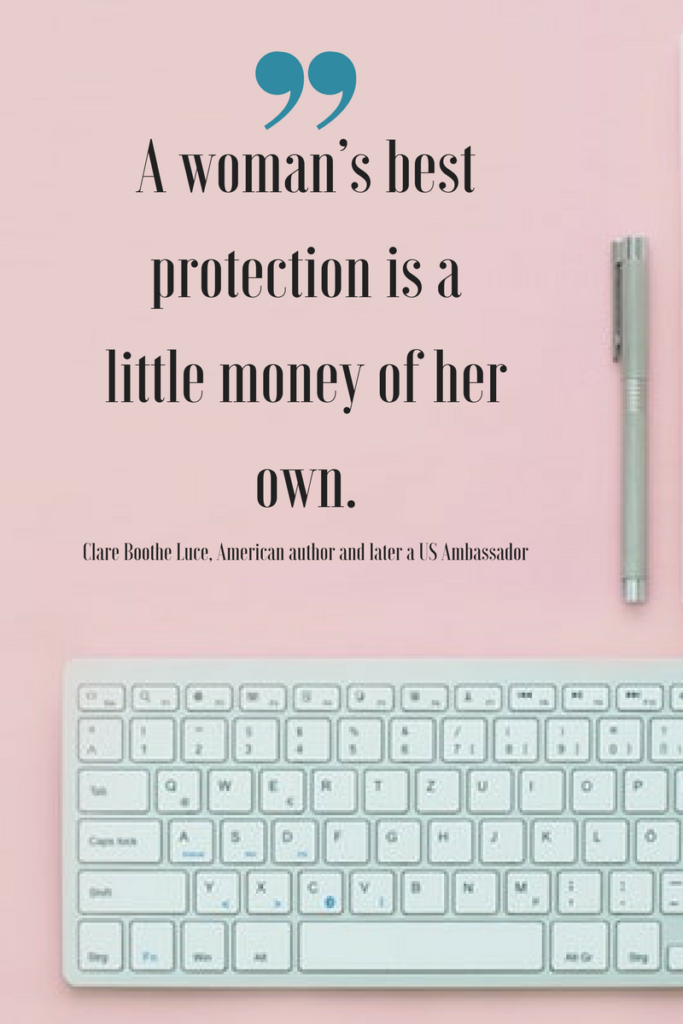
“Being rich is having money; being wealthy is having time.” – Margaret Bonnano, Author
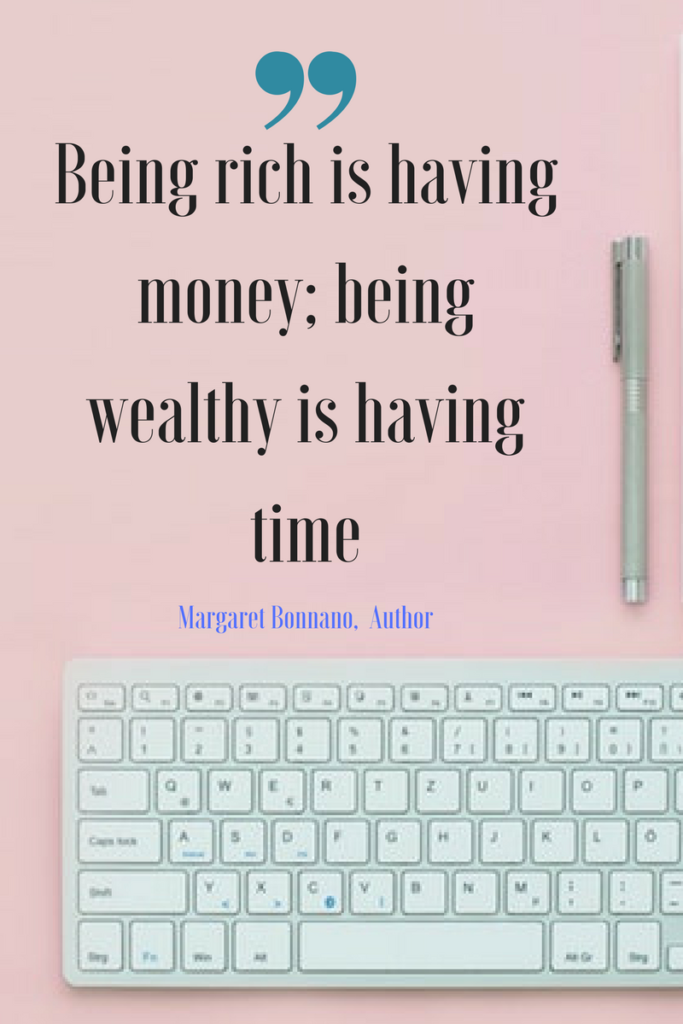
“You can only become truly accomplished at something you love. Don’t make money your goal. Instead, pursue the things you love doing, and then do them so well that people can’t take their eyes off you.” – Maya Angelou, Author, Poet, and Civil Rights Activist
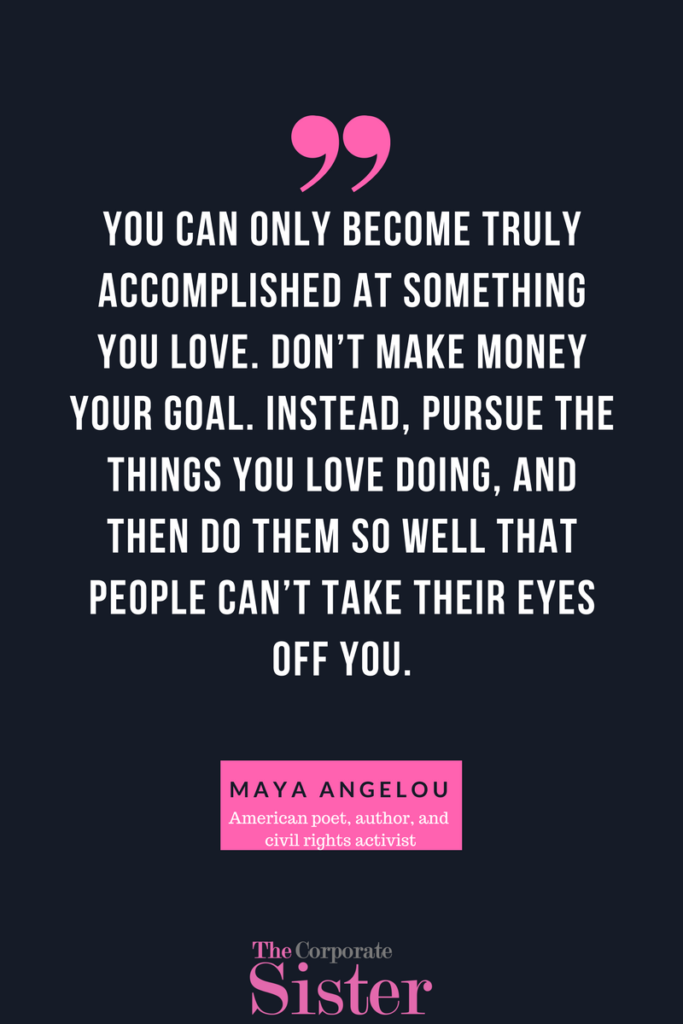
“Money follows art. Money wants what it can’t buy. Class and talent. And remember while there’s a talent for making money, it takes real talent to know how to spend it.” – Candace Bushnell, Author and TV Producer.
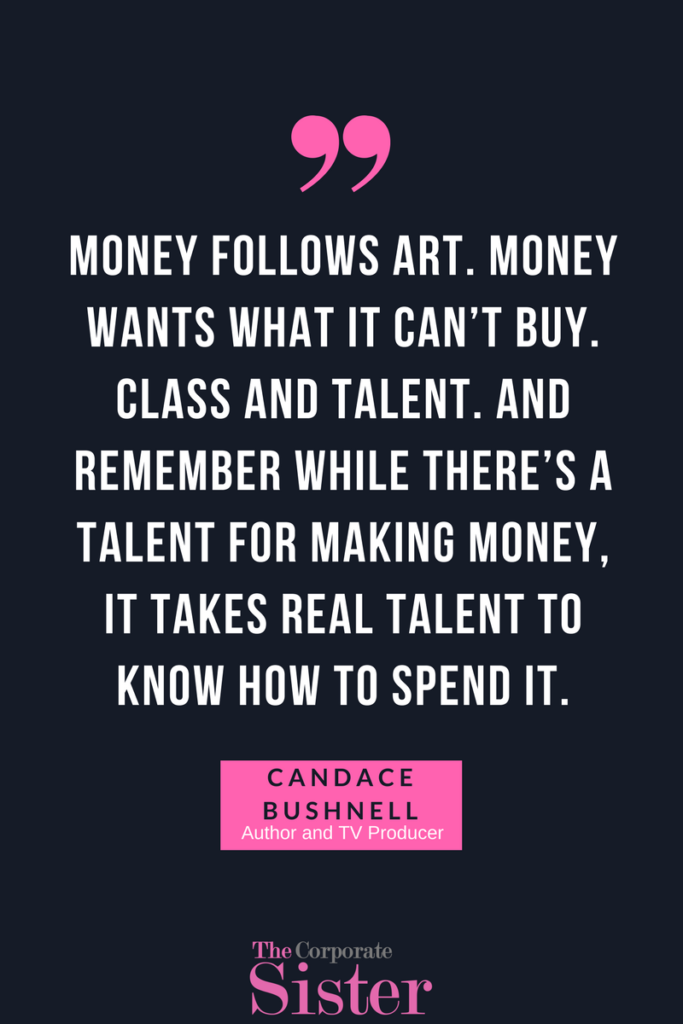
“There are people who have money and people who are rich.” Coco Chanel, French Fashion Designer

“By definition, saving – for anything – requires us not to get things now so we can get bigger ones later on.” Jean Chatzky, Journalist, Author and Motivational Speaker
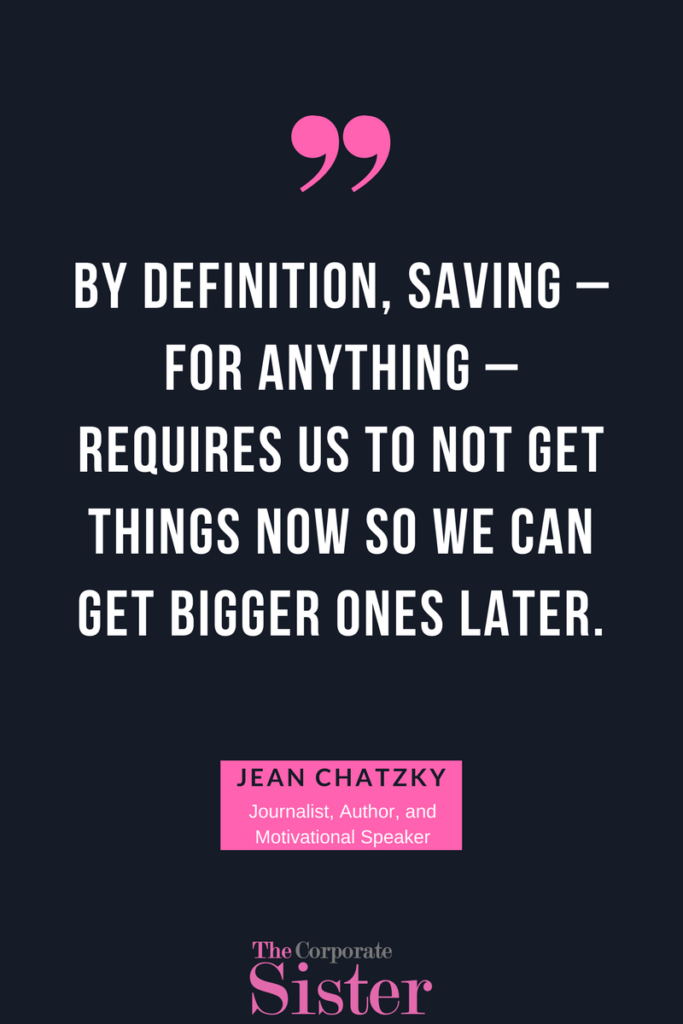
“I do not think I am successful just because I have money. I’m successful becauseI love who I am and I have no regrets“. Suze Orman, Author and Financial Advisor
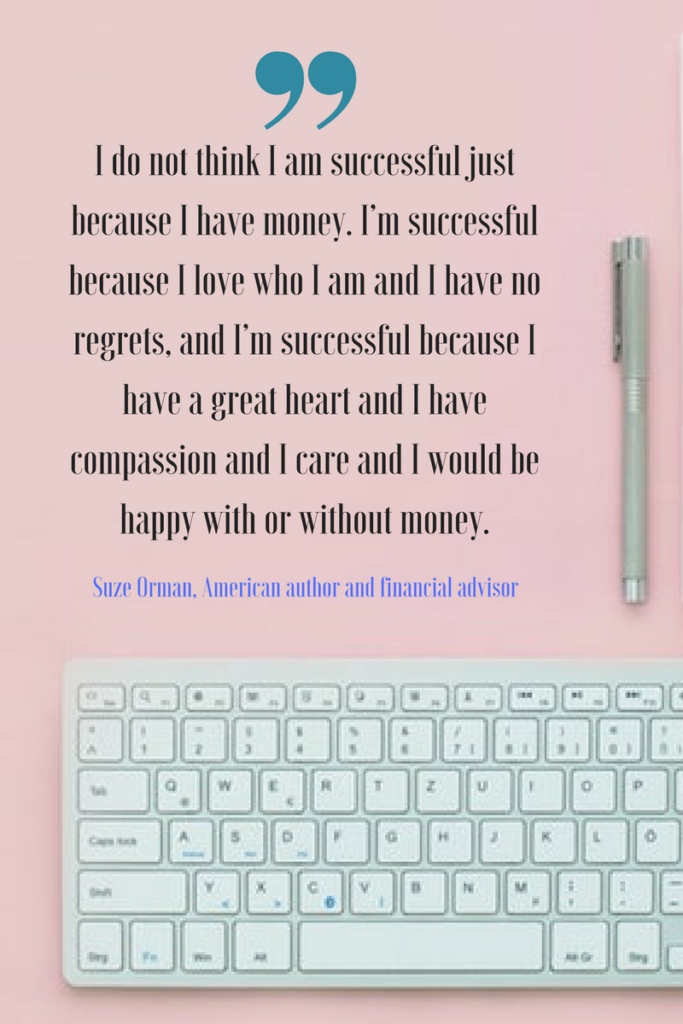
“People say that money is not the key to happiness, but I always figured if you have enough money, you can have a key made.” Joan Rivers, American Talk Show Host
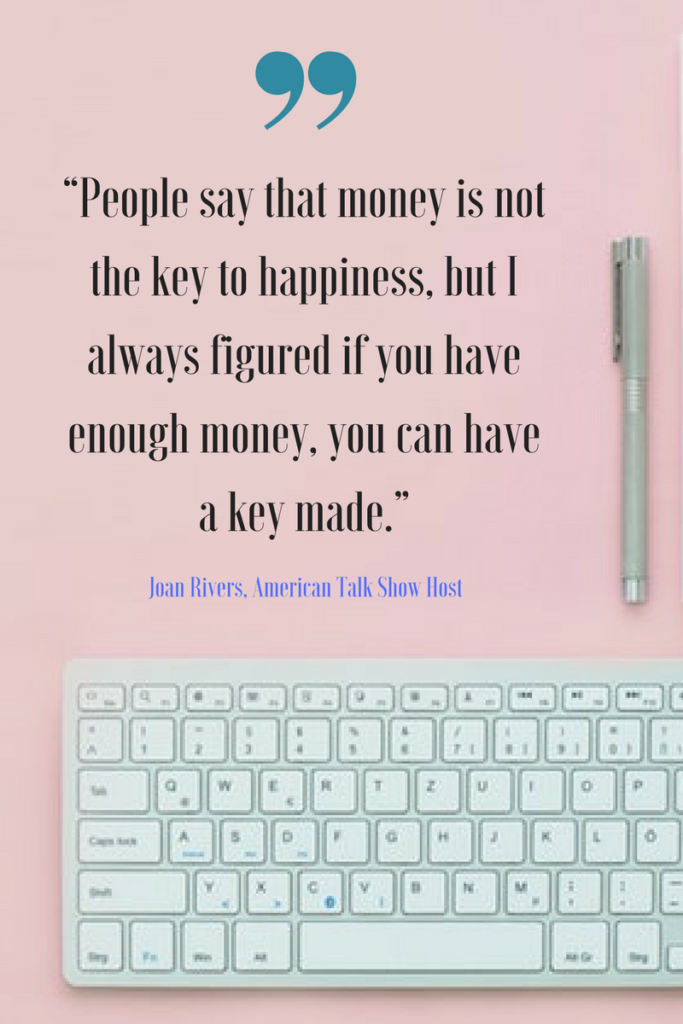
“Automating some of your finances can be incredibly convenient and is a great way to save time, but automating everything makes it too easy to go on autopilot and forget to pay attention to your personal finances.” – Alexa Von Tobel, Founder of LearnVest.com
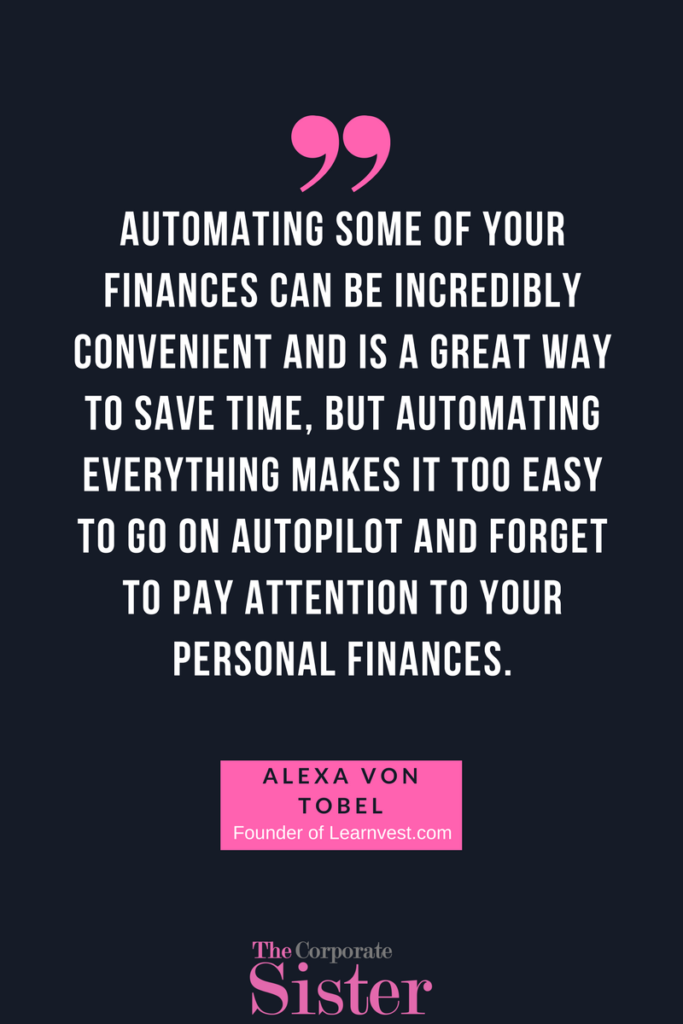
“To attract money, you must focus on wealth. It is impossible to bring more money into your life when you are noticing you do not have enough, because that means you are thinking thoughts that you do not have enough. ” Rhonda Byrne, Author of “The Secret”

What other powerful quotes from women about money would you recommend?
To Your Success,
The Corporate Sister.
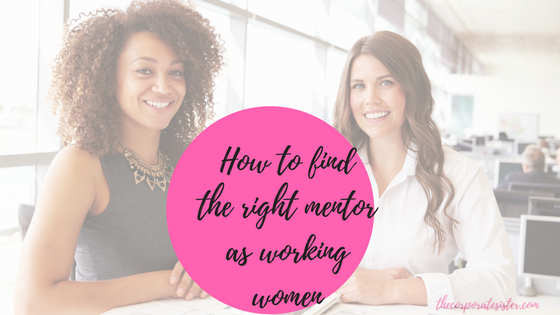
by Solange Lopes | Mar 7, 2018 | Career |
 There is no doubt that mentorship is invaluable for working women. As a matter of fact, it’s good for everyone, especially considering that not only can it provide working women with the appropriate resources, tools, and networking opportunities to thrive at work; but it also grants them access to rooms that would otherwise be closed off to them. However, finding a mentor, and finding the right mentor at that, can be challenging for women.
There is no doubt that mentorship is invaluable for working women. As a matter of fact, it’s good for everyone, especially considering that not only can it provide working women with the appropriate resources, tools, and networking opportunities to thrive at work; but it also grants them access to rooms that would otherwise be closed off to them. However, finding a mentor, and finding the right mentor at that, can be challenging for women.
In light of the recent #MeToo movement, an increasing number of men are admitting to being uncomfortable mentoring women. This adds to the pressure that many women face, as mentorship has been traditionally reserved to men. Not to mention the false view that there can only be so many women at the top.
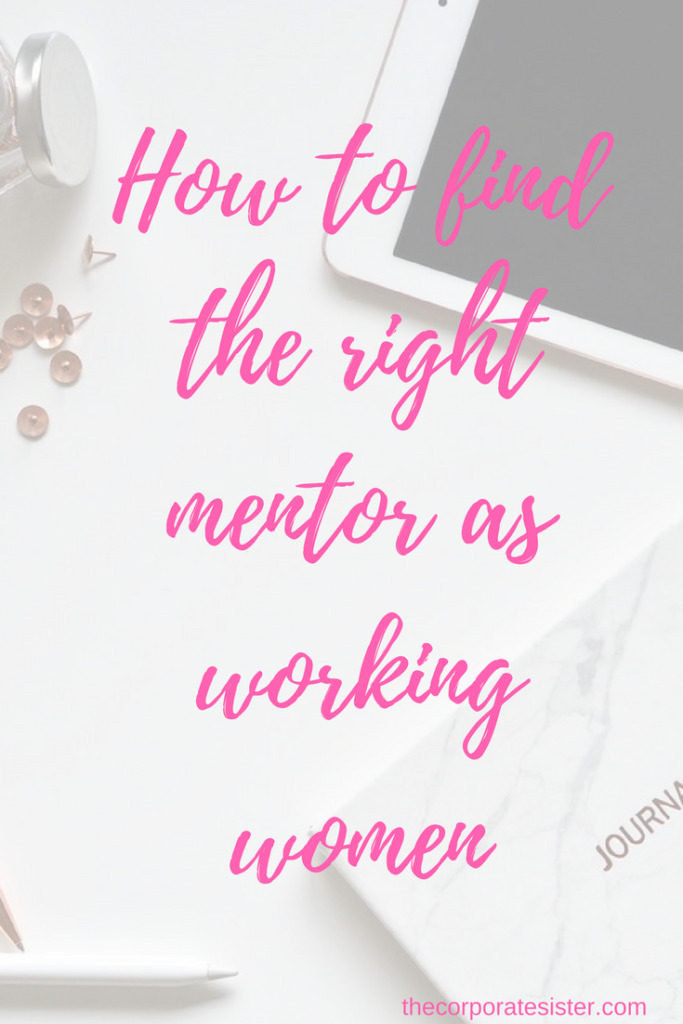
I know as a woman of color at work, finding the right mentors has been a valuable learning experience. I’ve definitely taken away some precious lessons from it, which have changed my perspective when it comes to mentoring for women.
If you’re looking for the right mentor for you as a working woman, here are 7 steps you may want to consider:
-
Get clear on your WHY
While you may be looking for a mentor to help you on your career path, it’s important to clarify what you need help with. Most likely, your potential mentor is a busy individual who only has a limited amount of time, energy and resources. In order to leverage these as efficiently as possible, you may want to get as clear as possibly as to why you need their help.
It starts with asking yourself what your career or business interests are. What drives you? What motivates you? What are your career and/or business goals? With a sense of where you are headed professionally or in business, it’s easier, and more rewarding, for a mentor to help you.
-
Shop Around
There are many aspects to consider when looking for the right mentor for you. You can start with writing down a list of the people who inspire you professionally and in business, and whom you’d like to emulate. These may be people you identify with, or who may have a career or business path you aspire to.
Look around your team, department or organization to identify potential mentors. Ask your manager or co-workers for recommendations as to people who could serve you well as mentors. Yet, don’t limit yourself to your direct environment. You can scour platforms such as Linked In to identify individuals in industries or sectors you look to get into as well. Remember that you can have virtual as well as physical mentors. I didn’t meet one of my mentors until we were over a year into our relationship, as we live in two different states. It’s ok to have a long-distance mentor-mentee relationship.
In the same token, don’t discount the simple fact of following people who influence you as a great source of mentorship. You may not be able to get in touch with Oprah, but you can still be inspired by and learn from her.
-
Pick selectively
Understand that picking a mentor is a serious decision that can have long-term impact. Hence, the need to selectively pick the best mentor for you. You may think that he/she is doing you a favor to serve as a resource to your career or business, which is true. However, being in a mentor-mentee relationship also requires you to be positively involved. As such, you don’t just want to pick someone you admire; but also someone you can trust, whose personality is compatible with yours, and who is also available.
-
Refine your Ask
My very first mentor started our first meeting with this question: “What can I do for you?” At the time, I was unsure about what it meant to have a mentor. As you pick one, it will be crucial to refine your ask. This goes hand in hand with clarifying your why.
How can this mentor help you? What are you looking to learn from them? Which areas of your career or business are you looking for help in? What goals are you looking to achieve? These questions will help you narrow down your ask and identify areas that your mentor can help you in.
-
Assess your compatibility
Picking the right mentor for you also means picking someone you can entertain a positive and fruitful relationship with. You will have to carefully assess whether your personalities are compatible, and you can actually communicate well.
While you may think that you may not necessarily have a say in picking a mentor, you actually do. Many companies will assign you a mentor, in which case your options may be limited. However, even in those instances, you may be able to diplomatically seek a different mentor.
-
Know that it’s a give and take relationship
One of the biggest misconceptions about mentorship is that it’s a one-way relationship. Many are under the impression that it is solely the responsibility of the mentor to provide help, resources and assistance to the mentee.
However, as in any relationship, there has to be a flow and exchange of resources. As a mentee, you also have to provide the willingness, follow-through and accountability needed to make it a successful relationship. When in doubt, ask your mentor how you can positively contribute to your relationship and what their expectations are.
-
Nurture the relationship
As mentioned earlier, mentorship is not just a professional exchange. It’s a personal relationship that requires frequent nurturing. As you find the right mentor for you, you also have to be prepared for regular meetings and frequent exchanges.
Entering this relationship with a clear intent of nurturing it will help you connect with the best mentors for you.
How did you find the right mentor for you?
To Your Success,
The Corporate Sis.
by Solange Lopes | Feb 25, 2018 | Career

Black Panther movie – Photo credit: bustle.com
There are many reasons why Black Panther is a classic, historical, boundary-breaking movie. As an African and a Black woman, seeing my children’s faces represented on the big screen as the heroes they are, showed me how important this movie is. The powerful representation of women was also a strong testimony to the importance of female leadership, especially when it comes to Black women and women of color.
One of the biggest and most impactful aspects of Black Panther was its female ensemble of women warriors and leaders. The fearless female characters played by Angela Bassett, Danai Gurira Lupita Nyong’o, and Letitia Wright demonstrated that women can not only lead, but they they can defend an empire or organization like no other. From the revolutionary spy Nakia (Lupita Nyong’o), to the army general Okoye (Danai Gurira), to Wakanda’s chief scientist and sister of the king Shuri, not to mention the Queen Mother (Angela Bassett), these women make up the very foundation of Wakanda’s society.
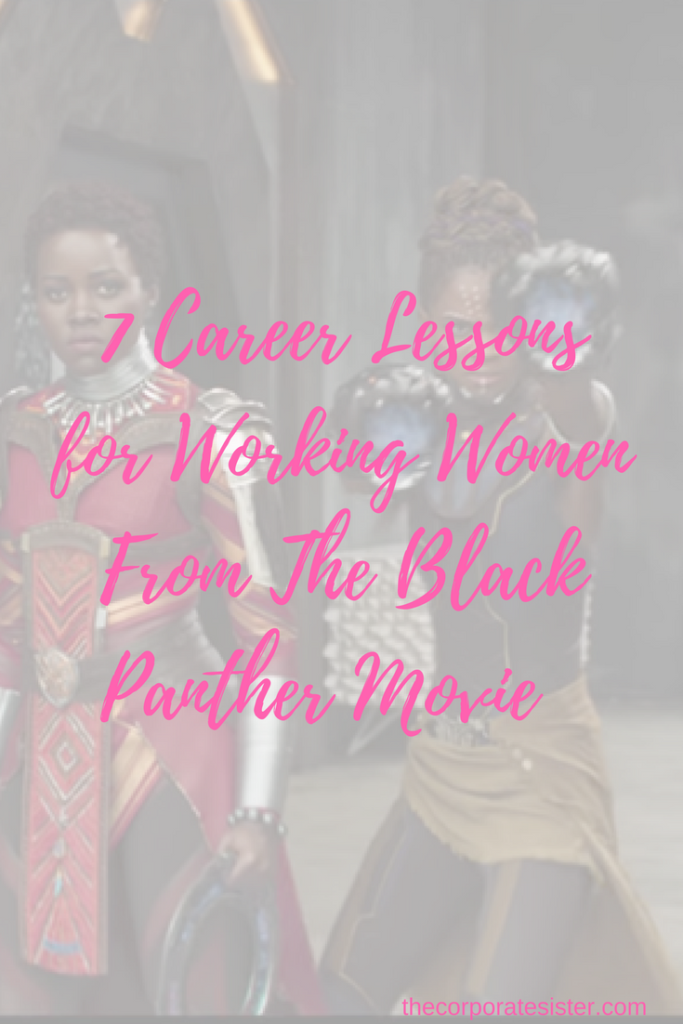
Most importantly, their work and undeniable leadership teach us a few precious career lessons as working women. Here are five of them I took out of the movie:
-
Be dedicated to your purpose
One thing that is evident throughout the movie is the women’s passionate dedication to their purpose. Nakia, one of Wakanda’s most trusted spies, is devoted to helping oppressed people and protecting Wakanda. Okoye, the “general”, is the head of the Dora Milaje, the army of women warriors in charge of protecting King T’Challa. She is also dedicated to Wakanda, at the risk of losing her own love W’Kabi after he decides to betray King T’Challa. Shuri, the “smartest woman in the world”, is committed to fighting for Wakanda through the power of technology. These are a few examples of the power of Purpose in the lives of the women of Wakanda.
How much more effective would we be if we, as working women, were also unwavering in our purpose? Very often, society has us believe in the obstacles to achieving our career purpose, more than in our capacity to overcome them. The women of Wakanda show us that unwavering dedication ultimately wins!
-
Don’t be afraid to communicate fearlessly
If there’s one thing that the women of Wakanda don’t do, is mince their words! From Shuri’s witty replies to Okoye’s authoritative commands, they don’t shy away from expressing their opinions. It is by standing by their principles and using their voices that they’re able to bring about change and victory.
What if, like them, we hesitated less when it came to sharing valuable knowledge and empowering opinions? What if we stepped into rooms traditionally reserved for men, like Okoye as the head of the army, or Shuri as a leader in STEM, with confidence and natural authority? It’s only by asking what we want that actually stand a chance of getting it.
-
There is no such a thing as male-dominated fields
If you ask me, Disney should start working on a Shuri princess pronto. This witty genius in the movie is the perfect advocate for girls and women in STEM. Think of how many young girls are now dreaming of creating technological wonders like Shuri. Think of all the girls and women of color who now consider it normal to see themselves heading a laboratory and making strides in science.
What if we stopped considering certain fields or areas as reserved to men? What if we ventured into traditionally male-dominated fields and shared our expertise? The best way to break barriers is to act as if they didn’t exist in the first place.
-
Intelligence and strategy beat power
From Shuri’s brilliance to the Dora Milaje’s army strategy in battle, the women of Wakanda display increadible intelligence throughout the movie. While their attractiveness is evident, it’s their mind and skill that call our attention.
As working women, it can be easy to discount our intelligence and strategic powers. We often think that the powers at play, especially in our careers or businesses, cannot be overcome. However, intelligence and strategy, skillfully used in our work, can open doors for us.
-
Show up just as you are
Authenticity is the signature power of the Wakandan women. While there are many layers to their characters in Black Panther, they never fail to show up just as they are. As strong and purposeful as they are, they also don’t shy away from assuming their emotions. They’re comfortable in their skins, and not afraid to face controversy.
How many times do we, as working women, feel compelled to wear a mask at work? We often think that adopting certain behaviors or even a certain voice, can help us be more successful. What if, instead, we unapologetically and fearlessly showed up as who we are? There may be places where we may not be accepted. However, our impact would be multiplied in the right environments.
-
The power of resilience is real
After T’Challa is defeated by Killmonger and is believed to be dead, it’s the women of Wakanda, including the Queen Mother, Nakia and Shuri, who seek ways to save the nation. Despite being distraught and at a loss, they decide not to quit. It is thanks to their resilience that King T’Challa is brought back to life and the nation rescued.
As working women, our professional paths can be long, winding roads filled with obstacles. We may be tempted to quit or give in to the pressure as we go. However, being persistent and resilient in our careers or businesses is what really helps us accomplish our ultimate goals.
-
Organizations with women in leadership always win
Last but not least, one of the most important lessons Black Panther teaches us all is that organizations with women in leadership ultimately win. From the female elders to the Queen Mother, not to mention the general Okoye, Nakia, and Shuri, the women of Wakanda are the foundation of their society. It is thanks to them that the nation is flourishing and ultimately saved.
This goes to confirm what modern studies and statistics have clearly demonstrated. Any organization with women at the top is bound to succeed.
What do you think is the most important lesson that Black Panther teaches us as working women?
To Your Success,
The Corporate Sister.
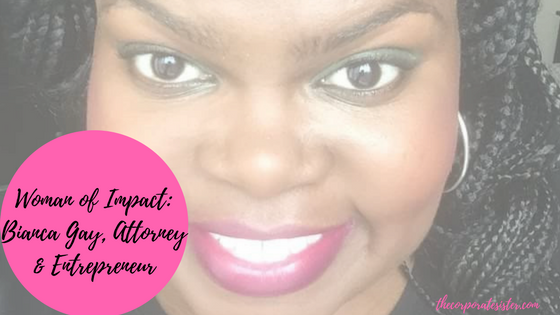
by Solange Lopes | Feb 12, 2018 | Career
 Our Woman of Impact feature presents women who are breaking barriers in their careers, businesses and lives. These women are inspiring us to do our best work and live our best lives. Today’s feature focuses on attorney and entrepreneur Bianca Gay.
Our Woman of Impact feature presents women who are breaking barriers in their careers, businesses and lives. These women are inspiring us to do our best work and live our best lives. Today’s feature focuses on attorney and entrepreneur Bianca Gay.
Bianca Gay is a brilliant Boston business attorney and entrepreneur whom I virtually met online. I started following her, as I was drawn to her impeccable legal advice, especially as related to immigration matters. Her sense of humor and savvy business advice is also always on point. Read more on the gems she generously shares with us in this interview…
Hi Bianca! Tell us a bit about yourself.
I’m an attorney. I mostly practice immigration and business law, with a bit of family law on the side. I also do compliance for a healthcare company. I actually do compliance for a number of companies, by helping them determine whether their policies and procedures are in compliance with the law.
What prompted you to set up your own practice?
I’ve always wanted to work for myself. Just for the purpose of having the autonomy to decide what kind of day I would have and what case I would work on. However, I’ve always wanted to work for someone else first. However, after I graduated in 2013, I didn’t pass the bar the first time. I did it again and passed. I applied to many firms, but at the time, didn’t find any open position, so I decided to start my own business. Nowadays, I split my time between working on and off for companies and working for myself.
What does a typical day look like for you?
I don’t really have typical days. Lately, I’ve been really busy. I do compliance for a company, and with open enrollment, it’s been quite busy with everything happening in Washington. My day is typically just working. If it’s not working on compliance for clients, I’m working on immigration cases, or tracking the laws in effect. It seems like immigration laws are always changing. I’m also trying to get my workout life in control and get back to it.
What advice would you give other women who are looking to work for themselves?
I would say to think about what you really want to do, first of all. I find that a lot of people want to work on their own because they want to set their own rules and work for themselves, but in doing that, literally everything falls on you, especially when you’re starting out. You may not have a staff, so you may have to be the secretary, the person going to the post office, doing every single thing for your practice. Just make sure that you’re able and willing to do that. Also, there’s no rush to want to work on your own full-time. The reality is, we’ve got bills to pay. I mean, I do compliance work for a healthcare company right now. I do a variety of things on the side, but we’ve all got to do what we’ve got to do.
Even if you decide to quit your job, and you realize it’s too hard, or you’re not making as much money as you want, or its’ not what you wanted, you can always go back to work. There’s no finality when you leave your 9-to-5, you can always go back. Worst case scenario, if your law firm fails, you can always go work for someone else. You can always go back and forth. There is no finality of when I quit working my 9-to5 , I can never go back. Working on your own gives you the option and the flexibility to go back to a 9-to-5. I actually know a couple of attorneys who work 9-to5 for corporations and have their own practices as well. This way they have the security and consistent income on both sides while being able to have all their benefits. There’s so much flexibility as to how you work nowadays that it’s no longer an all-or-nothing approach.
I like your realistic take on it? Can you tell us more?
I’m all about having a backup plan. I never had a backup plan until I was forced to have one. I always wanted to be an attorney since I was 12, that’s all I’ve always wanted to do. I didn’t have a backup plan in case I wouldn’t be able to do it. When I didn’t pass the bar, I was petrified because I didn’t know what else to do. That’s when I started exploring what my other interests were, tapping into my other experience. I majored in International Business and I have my MBA. I thought maybe I could do consulting with my MBA.
I also have my real estate license. I thought if anything, if all else fails, I can always go sell real estate. I’m also not too proud to go work at a mall if I need to. We’ve all got to do what we’ve got to do to make our dreams work. I just don’t want people to think that there’s a particular way to do it, or if they stay at their 9-to-5 longer than they have to, that they’re a failure because they’re not doing their passion full-time. Sometimes it can be a blessing in disguise. You may be really passionate about this thing you want to do, and then you do it full-time and find out that you’re burnt out really quickly, whereas when you were doing it part-time, you weren’t. Or you’re doing it full-time and it’s not what you thought it would be. I think that everything happens in our lives when it’s supposed to happen. The best we can do is go with the flow, and take it day by day, and not be in a rush to have this dream lifestyle that we see everybody showcasing on Instagram.

What’s the best part about what you do?
For me, it’s helping people. It’s being able to take cases that other people wouldn’t take. I actually have a friend of mine who needs a lawyer right now and she lives in another state, so I can’t help her because I’m licensed in Massachusetts. Unless it’s an immigration case, I can’t take cases in other states. It’s breaking my heart that I can’t take her case, because she’s not getting any lawyer to help her because it’s not a money-making case.
For me, the main reason why I wanted to become a lawyer was to help lower-income people. Being on my own means that I have control over all the cases that I take. Whereas other lawyers may reject a case because it may not make them a lot of money, I may accept it. Any domestic violence case I do, I do pro bono. Many law firms may not do that because they either don’t have the time or don’t find it to be a priority. I like that I have complete control over how many cases I handle at a time, what kind of cases I handle. Obviously, I’m in business, so I can’t do all cases pro bono, but I’m able to take cases that are not necessarily money-makers.
What are the main challenges that you face in your work?
Currently, my biggest challenge is trying to convince clients that you provide value. We live in a DIY society where everyone is turning to Legal Zoom. People are asking: “Why would I pay you when I can go to Legal Zoom to do it?” I try to show people that when they hire me, they actually have a real attorney helping them. They can ask questions, and in a lot of instances, they’re actually getting me to work for them, as opposed to filling out a form on Legal Zoom. If you have questions or want to customize things on Legal Zoom, you don’t really have that luxury, whereas when you hire an attorney, you do. You have someone who can help answer all your questions, walk you through the entire process and be there for support. My challenge is really fighting the Legal Zoom of this world, and show people the benefits of using real lawyers. Not everything can and should be replaced by a computer.
As a woman of color, what advice do you have for other women of color in this field?
Above anything, you should stay true to yourself. I believe wholeheartedly in bringing your whole self to work, not a watered-down version that you think people may not like. What happens if they don’t like that person? I feel like if you don’t like me and take me as I am, you’re not for me. Honestly, I’ve never been in a situation where I’ve had to change who I am to fit into any work environment. I have for the most part been the only woman of color in a lot of my professional settings, and I’ve always worn cornrows, braids, ‘fros, unapologetically. It’s never been an issue. I’ve always brought my whole self to work. I’ve never been in a place where I felt that being myself was not ok. The minute that if ever I were in a situation and I felt that way, I would leave. Diversity matters, and I feel that the more others see us as who we are, the more they’ll get used to it. I realize it’s really not that big of a deal. It’s the others’ responsibility to deal with what whatever negative impression they have of us.
We have so many women who are showing that they’ve been able to be successful by being themselves. Women like Oprah, or Bozoma St John, or Whoopi Goldberg. I refuse to believe that we still need to water ourselves down to be successful.
What books are you reading right now?
I’m reading two books right now. I’m struggling to find the time to read much, which is one thing I miss about my old commute. One of them is “Drop the Ball” by Tiffany Dufu. I met her a couple of years ago, by chance. The first time I met her, at an event where I was a volunteer, she basically told me to not wait for anyone to tell me what to do and go do it on my own. I randomly found her book, and went to a book signing with her.
The other book I’m reading is “You’re a badass at making money”, by Jen Sincero. It gave me the courage to negotiate on my behalf. Although I would negotiate for my clients, I wouldn’t necessarily do it for myself.
What are you listening to these days?
I don’t listen to a lot of music unless I ‘m working. I used to listen to music in my car, but now I’m listening to a lot of podcasts. I’m listening to Bodak Yellow on repeat right now, I do like the beat. I listened a lot to Kendrick Lamar before. But mostly, I listen to a lot of podcasts.
What is your best way to relax?
I really like boxing, which I started in high school. Other than that, taking a nap woud be pretty nice.
What advice would you have given you 20-year old self?
To take more risks. I was always the one to do things by the book, which was probably a result of being a child of immigrants. My mom is definitely not a risk-taker, while my dad really is. She’s worked at the same company for 30 years. In my 20’s, that’s what I did. I worked at a job I didn’t like because I thought that’s what I had to do. In my 30’s, I’m more confident, and I’m striving to live life on my terms. I wish I were more like that in my 30’s. Life is short, do what makes you happy.
Where can we find you?
You can find me on Twitter at @bjgesq, and on Instagram at @attorneybianca.
Thank you so much for sharing all these gems with us, Bianca!
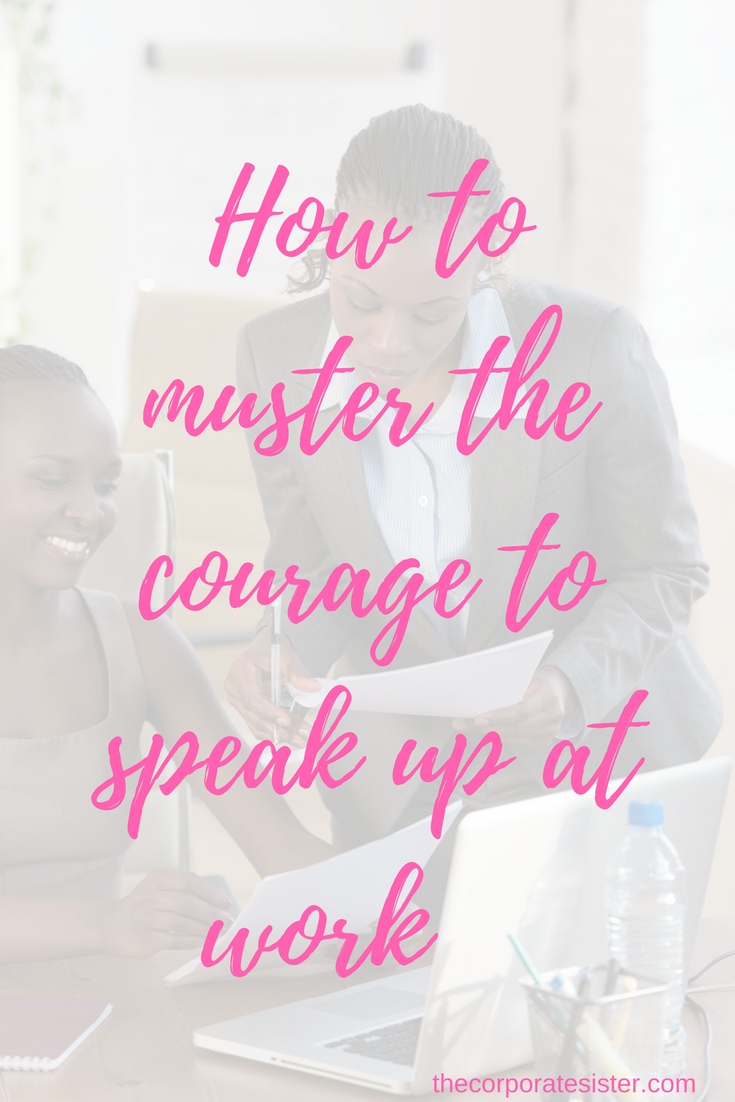
by Solange Lopes | Feb 7, 2018 | Career
 For many of us working women, speaking up and expressing our opinions in the workplace is a challenge. From doubting our own abilities to fearing what others may think about us, we tend to refrain from expressing ourselves fully in the workplace. As a result, many women run the risk of not being considered management or leadership material, be passed over for promotions, or flat-out ignored at work.
For many of us working women, speaking up and expressing our opinions in the workplace is a challenge. From doubting our own abilities to fearing what others may think about us, we tend to refrain from expressing ourselves fully in the workplace. As a result, many women run the risk of not being considered management or leadership material, be passed over for promotions, or flat-out ignored at work.
I, like so many other working women, would know. Through countless conversations with fellow colleagues and friends, it was apparent that one common fear among us is to speak up at work. I would literally get paralyzed at the thought of raising my voice in a meeting or conference. The false anticipation that I may be ridiculed, laughed at, or that my ideas may not be valid or discounted, would keep me from sharing my otherwise valuable insights. I believe I missed many opportunities because of my silence. I know I’m not the only one…
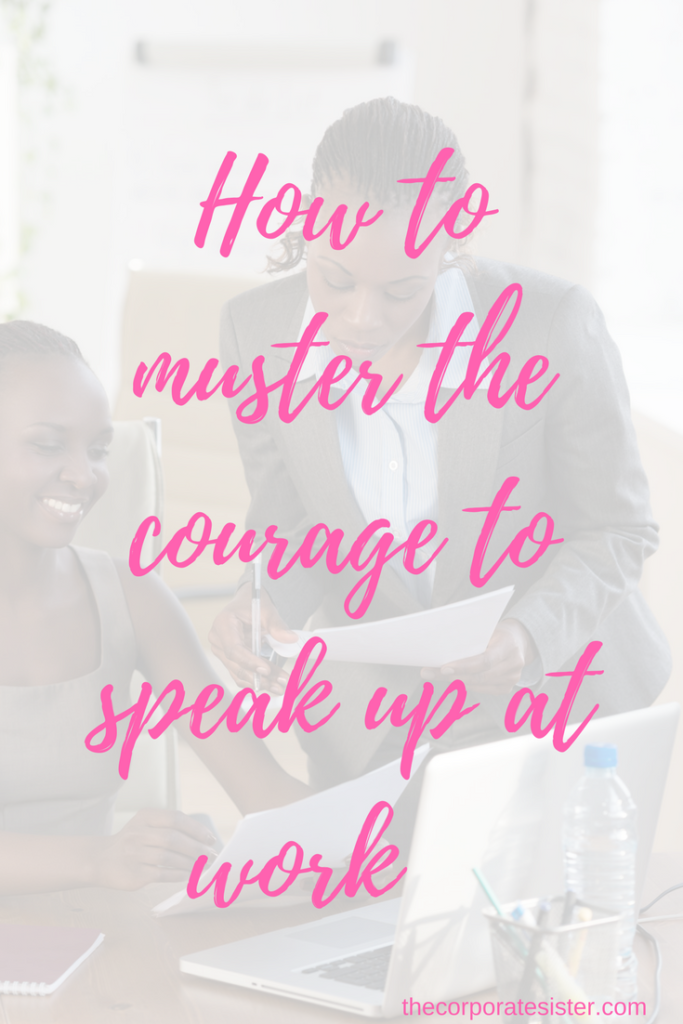
Hindsight being 20/20, I now realize there are many things I could have done to fight the fear of speaking up, even as a woman of color at work. Despite the difficulties or opposition you may face as a woman at work, you can train yourself to muster the courage to speak up. Here are a few ways to do so:
-
Understand the source of your fear of speaking
For many, if not most of us, the fear of speaking up at work stems from our own feelings of unworthiness or inadequacy. We may fear sounding ridicule, or that our contributions may be mocked. Instead of taking what we perceive to be a risk, we shrink, letting others take the credit for our work and claiming ideas we thought of first.
Understanding the source of your fear can help you tackle it in a more effective way. Are you feeling inadequate because you’re the only woman in the room? Do large meetings make you uncomfortable or nervous? Did you grow up with a sense of inadequacy? Ask yourself the hard questions, and get to the root of your fear.
-
Change your internal dialogue
Once you’ve understood the source of your fear, it’s time to work on your internal dialogue. Track the negative thoughts such as “I am not smart enough”, “I am not qualified enough”, “I’m too young”, “I’m too old”. Instead of replaying this negative dialogue in your head, consider replacing these thoughts by positive ones, such as: “I am capable”, “I am qualified”, “I can do all things”.
The more you hear yourself say positive things about yourself, the more you tend to believe it. It unfortunately also works in the reverse.
-
Prepare ahead of time
Preparing ahead of time and rehearsing before a meeting, presentation or other event you may have to speak up at, can go a long way. Before every meeting you are to attend, consider brainstorming and jotting down at least three (3) ideas you can contribute to the conversation. If you have the time, practice sharing these ideas by recording yourself, until you are satisfied with the way you sound. You may also do the same if you have an upcoming presentation.
The more you prepare yourself and get in the habit of speaking up, the more comfortable you’ll feel. Don’t hesitate to take your time so you can actually overcome your fear of speaking up.
-
Join public speaking organizations or groups
Public speaking organizations such as Toastmasters International can be a tremendous help when it comes to speaking up at work. By providing a supportive and positive learning experience for you to develop your communication and leadership skills, they help you hone in on your speech and public speaking skills.
Within your own company, there may be other communication and leadership groups that can also assist you with this. Keep your eye open for events and opportunities teaching public speaking skills as well.
-
Get support
Don’t be too proud not to ask for support if you’re struggling with speaking up at work. You can get an accountability partner to encourage and support you as you work on developing your public speaking skills. Similarly, you may decide to add speaking up at work, as one of your goals on your performance review.
In any case, don’t shy away from getting the support you need to improve this area of your performance.
-
Reward yourself
Last but not least, don’t forget to reward yourself for overcoming your fear of speaking up. I used to treat myself to a new book every time I would make a significant contribution to a meeting. For an introvert like myself, mustering the courage to speak up was always encouraging.
How do you muster the courage to speak up at work?
To Your Success,
The Corporate Sis.

 One of the biggest obstacles women face at work and in life has everything to do with money. From not being paid on an equal scale with our male counterparts, to managing our own finances, dealing with money can present serious challenges for the modern woman. If you add to it the common stereotypes affecting women in all areas of work and life, establishing good financial habits can be quite the daunting prospect. Hence the need for some solid financial advice, as well as inspirational quotes about money from women who have mastered their own finances.
One of the biggest obstacles women face at work and in life has everything to do with money. From not being paid on an equal scale with our male counterparts, to managing our own finances, dealing with money can present serious challenges for the modern woman. If you add to it the common stereotypes affecting women in all areas of work and life, establishing good financial habits can be quite the daunting prospect. Hence the need for some solid financial advice, as well as inspirational quotes about money from women who have mastered their own finances.



























